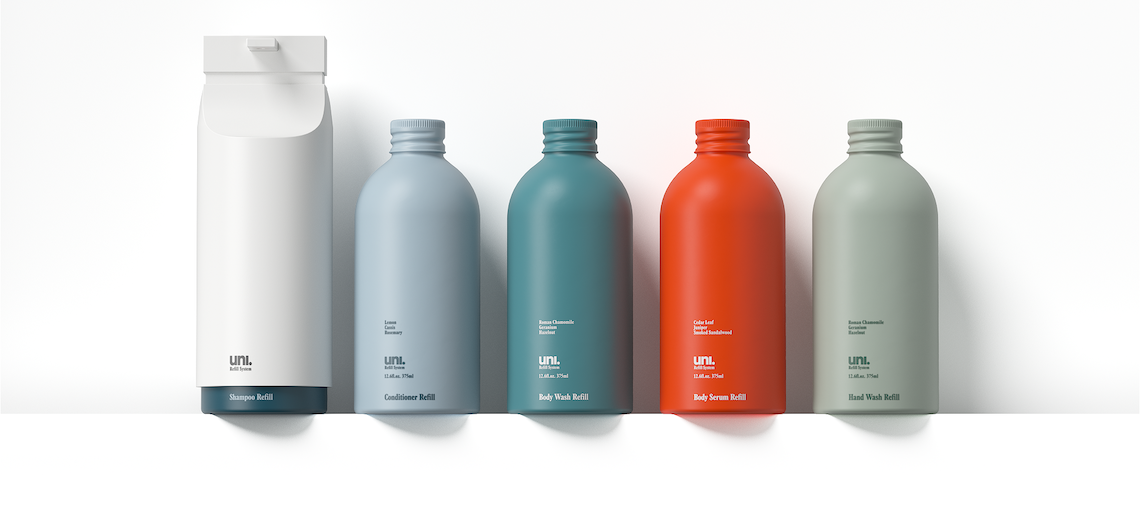When former tech founder Alexandra Keating was conceptualizing her body-care company, Uni, she was inspired by a decidedly low-tech business model: the milkman.
Launched February 16 with $4 million in investment from major entertainment figures including Guy Oseary and Ashton Kutcher, Uni features a closed-loop system and brands itself as gender-neutral. On the brand’s DTC site, customers can buy aluminum bottles of shampoo, conditioner, hand wash, body wash or body serum that are attached to a reusable pump. When the bottles run out, they can send them back to the brand to have them refilled. Uni’s team includes alumni of Estée Lauder and Drunk Elephant, with high-caliber creative talent supporting its design and promotions.
“We’re really trying to be closer to the milkman, basically,” said Keating, of Uni’s closed-loop system. “Bigger people in the industry thought I was crazy. But now that they’re having supply chain issues, they think that it’s the best solution.”
The investment from Oseary and Kutcher comes through SOUNDWaves, a sustainability-focused ESG investment vehicle that is part of investment firm Sound Ventures, which the two co-founded.
“The shift to reusable, refillable, and ocean-safe solutions should be adopted by every player in the industry,” said Kutcher in a statement. “The hospitality industry is far too reliant on single-use packaging.” The brand is planning to introduce its products to hotels to replace single-use packages.
Design was as much a priority as sustainability for the brand, which brought in Marc Atlan as its creative director. His experience includes designing the refillable makeup containers for Kjaer Weis and the famous concrete fragrance bottle by Commes des Garçons. He is also known for his work with Maison Margiela.
“I hunted him down,” said Keating, of Atlan.
Ad position: web_incontent_pos1
To shoot the brand’s campaign, Keating also brought in major entertainment world talent, including photographer Nabil Elderkin, who is known for his work with Kanye West, fashion and beauty photographer Amanda Charchian, and Miley Cyrus’ makeup artist James Kaliardos. It also enlisted NFT artist Taehoon Park to create (non-NFT) digital renderings of the products.
Made out of bio-resin, the refillable pumps last for two years, according to the brand, and then should be sent back to be disassembled and recycled. When mailed back, the brand states it adopts a “carbon-neutral” shipping model. Aluminum refill bottles can also be recycled if not sent back.
Uni emphasizes sustainability in its formulations, as well, citing reef-safe and upcycled ingredients created from olive oil industry waste. It also includes marine-derived ingredients that it says are ethically sourced. The brand is donating 1% of sales to the Coral Gardeners organization that protects and restores coral reefs, and is participating in the UN Climate Neutral Now initiative.
“I wanted it to obviously be clean, and I know clean is now a dirty word. So [I asked], what is the next generation of that? We believe the next generation of that is zero waste,” said Keating, regarding the product formulation.
Individual bottles start at $25 each, or customers can purchase a full set of the brand’s products for $179.
Ad position: web_incontent_pos2
While Uni is starting out DTC, Keating said she is in talks with retailers in hopes that the brand will eventually be featured in a retail location where users can return the bottles in-store.
The closed-loop model is increasingly gaining traction in beauty and personal care. TerraCycle’s Loop program, which has partnered with Procter & Gamble, offers a range of brands and products with closed-loop packaging. Sold through Ulta, Loop-partnered brands will also soon be sold at Walgreens and Kroger’s.
For now, the brand is focusing on DTC, in order to learn about its customers directly.
“We don’t really know who’s going to love Uni and who’s going to be our tribe, and I want to let that happen organically,” Keating said. “A lot of investors in the consumer space really want a retailer, just to ease up the risk associated with their investments. So it’s amazing that everyone’s supporting us without that.”
In her view, now is the time for the industry to eliminate single-use plastic.
“There’s a lot of greenwashing out there. I don’t love the way brands pledged to reduce single-use plastic by 2025. They shouldn’t be rewarded for future promises. Uni is the solution today.”




